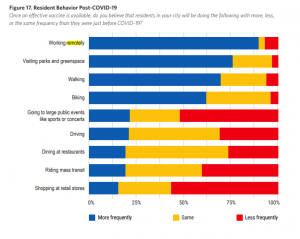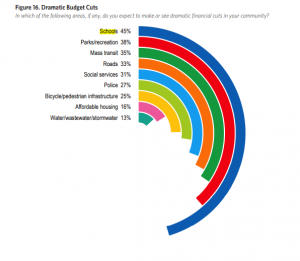
Photo: City-NY-jack-cohen-3Q_dO9xKQ_M-unsplash
US mayors predict permanent shifts in post-COVID cities
07 December 2020
by Sarah Wray
According to a new survey, 90 percent of US mayors believe the shift to remote working will persist even after a COVID-19 vaccine is available, and 60 percent expect a permanent reduction in in-person retail shopping.
With this in mind, 60 percent agreed that downtown office buildings will become less desirable and 40 percent are expecting less mass transit use in the future, this year’s Menino Survey of Mayors from the Boston University Initiative on Cities finds.
Over half of mayors expect a long-term decline in residents attending large public events like sports and concerts.
On a more positive note, large majorities expect more walking, cycling and time spent in parks after COVID-19 than before. Forty percent predict the same amount of transit ridership as pre-pandemic levels, and 20 percent expect to see greater usage.
Further, contrary to some predictions, most mayors don’t expect the pandemic to increase driving in the long-term. A majority predict the same amount of driving after COVID-19 as before, with the rest split between more and less personal vehicle use.
The survey gathered responses from 130 mayors in cities with populations over 75,000.

“In the seven years of conducting the Menino Survey of Mayors, one of the most consistent findings, no matter the question topic, is a general sense of optimism among our cities’ leaders,” said Graham Wilson, Director of Boston University’s Initiative on Cities. “This year, while we still hear glimmers of optimism, their pessimism in the face of a once-in-a-century pandemic is palpable. And with the pandemic still spreading and the federal government still unable to come to an agreement on additional stimulus, we suspect mayors may actually be underestimating just how much their cities will change.”
Economic impact
Mayors cite the impact on schools as a top long-term concern, with 45 percent expecting to see “dramatic” cuts to public school budgets. Over a third are also braced for dramatic cuts to parks and recreation funding (38 percent) and transit (35 percent). However, 30 percent of mayors could not name any area where they anticipate dramatic cuts.
Only around a third expect small businesses that closed due to COVID-19 will be quickly replaced by new ones.

Among all their constituent groups, mayors are most worried about the long-term economic impact on communities already suffering from structural racism and inequality: roughly two in three said that Latinos, renters, immigrants and black residents would still be feeling at least “a lot” of economic harm from COVID-19 next summer. Additionally, over 80 percent of mayors expect racial health disparities to widen in the future – they do not expect the attention COVID-19 is bringing to the issues to lead to progress.
Additional economic stimulus from the federal government remains uncertain but most mayors agreed that even the previous stimulus funding through the CARES Act was not enough to address the needs of their cities. Only 13 percent of mayors believe these programmes provided enough support to match the needs of their cities’ small businesses, while nearly half said there was a “large gap” between what was made available and what was needed.
In the absence of federal or state support, mayors said they would look to the creation of new grants (36 percent) and loans (28 percent), along with regulatory relief (30 percent).











